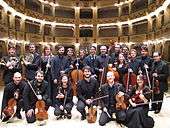Orchestra Mozart Academy
The Orchestra Mozart Academy is an Italian chamber orchestra based in Bologna.
Creation

The orchestra was created in 2004 by Claudio Abbado as a special project for young musicians within the Regia Accademia Filarmonica (Philharmonic Academy) of Bologna and managed by Giuseppe Modugno and Caterina Coretti..
The orchestra gave several concerts[1][2][3] in Italy and abroad.[4]
Composition
The orchestra is basically a chamber orchestra. However, the number of musicians sometimes exceed this format: in the concert performed on May 9, 2010 in the Church of the Holy Cross, Augsburg , the orchestra played Mozart and Gibelli - conducted by Boris Schaefer - with trumpets, timps, choir and soloists .
The orchestra acts as a meeting-place for young musicians from many countries, selected every 2–3 years by experienced musicians like the violinists Giuliano Carmignola and Gisella Curtolo, Raphael Christ, Cristiano Rossi, the viola player Danusha Waskiewicz, the cello players Enrico Bronzi, Walter Vestidello, Gabriele Geminiani, the double-bass players Alois Posch, Lutz Schumacher, the flautists Jacques Zoon and Andrea Oliva, the oboist Lucas Macias Navarro, the clarinet player Alessandro Carbonare, and many others.
Conductors and soloists
Orchestra Mozart Academy was conducted, among the others, by Boris Schaefer, Giuliano Carmignola, Sergej Krylov, Alexander Lonquich, Jacques Zoon, Lorenza Borrani, Alessandro Carbonare, Enrico Bronzi, Lucas Macias Navarro and many others.
Recordings
The orchestra conducted by Enrico Bronzi is featured on a CD edited by Italian musical review Amadeus with music of C.P.E.Bach[5]
References
- "L' Accademia Mozart incontra il violino di Carmignola". Archivio - la Repubblica.it.
- Nertibe srl :: e-business division. "ATTENZIONE! VARIAZIONE DI PROGRAMMA". iteatri.re.it.
- "Boccherini e Haydn per i giovani dell'Accademia Orchestra Mozart - Ravenna24ore.it". ravenna24ore.it.
- "Augsburg, Germany's City Of Mozart ~ Dates and Events". mozartstadt.de.
- http://www.discogs.com/Carl-Philipp-Emanuel-Bach-Accademia-DellOrchestra-Mozart-Enrico-Bronzi-Concerti-per-Violoncello-E-Or/release/5338138